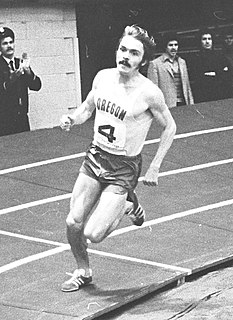A Quote by Marty Liquori
Run your own race at an even pace. Consider the course, the temperature, the weather, and most importantly, your current level of fitness.
Related Quotes
Your goal is simple: Finish. Experience your first race, don't race it. Your first race should be slightly longer or slightly faster than your normal run. Run your first race. Later you can race. You will be a hero just for finishing, so don't put pressure on yourself by announcing a time goal. Look at it this way: The slower you run the distance, the easier it will be to show off by improving your time the next race!
I raised you to be a thoroughbred. When thoroughbreds run, they wear blinders to keep their eyes focused straight ahead with no distractions, no other horses. They hear the crowd, but they don’t listen. They just run their own race. That’s what you have to do. Don’t listen to anyone comparing you to me or to anyone else. You just run your own race.
We all run on two clocks. One is the outside clock, which ticks away our decades and brings us ceaselessly to the dry season. The other is the inside clock, where you are your own timekeeper and determine your own chronology, your own internal weather and your own rate of living. Sometimes the inner clock runs itself out long before the outer one, and you see a dead man going through the motions of living.
Fartlek, or speed play, is variable-pace running that emphasizes creativity. During a 30-minute run, choose objects to run to - telephone poles, trees, buildings, other runners, whatever. Make choices that mark off different distances, so your pickups vary in length from 15 to 90 seconds, and modify your pace to match the distance.
Every inch of my writing career has been influenced by my screenwriting education. I was lucky enough to go to film school at USC, and I got a crash course in how to tell a story efficiently. I learned structure, pace, my style, how to know your audience, and most importantly, how to take criticism and edits properly.





































